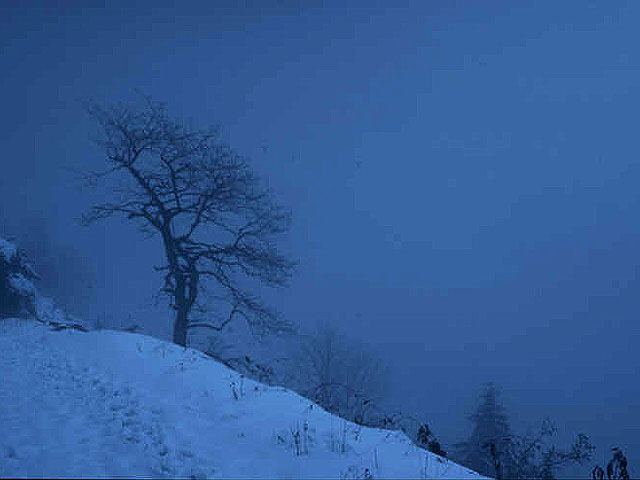
P/P | r2c | November: "Rowan Fall" and Poetry in the Key of Minor

P/P | r2c | November: "Rowan Fall" and Poetry in the
Key of Minor
 |
"There's a charged whispering ever higher and less soft / the sea turns its ear; and listens, and hears how after the night before tomorrow stormy weather is on its way." This week, an image from the Alps, "Rowan Fall". Also: ten new translations of Lowland poems.
|
Tien Gedichten; Ten
Poems
The guest poems for this week are new English
translations of a set of ten Dutch pieces.
The featured poets are, Edithe de Clercq
Zubli, Ellen Warmond, Anton Korteweg,
Louise van Santen, Gerrit Achterberg, Herman de Coninck,
Paul van Ostaijen,
K. Michel
and Han G.
Hoekstra:
POETRY IN THE KEY OF MINOR
In music, one of the mysteries of mysteries is how the difference of but
half a tone, of tuning a major third down a half step to a minor third, seems
to shift the quality of a sound from bright to dark, from day to night.
Indeed, there is a quality of moving out, of ascending, which we hear in
the major third. In contrast, the minor, or smaller, third seems more pensive
and descending in nature.
What we are sensing, it seems to me, has something to do with how sound
centers itself in space. In a way, one could say that these different tonal qualities
of ascent and descent are much like the crown and roots of a tree. The comparison
does bring out something I'd like to give emphasis to here, which is the comple-
mentarity of the two different movements we think of as major and minor—and
more especially the balance between them.
Balance—in flowing movement. Of course we could say that this is not only
of great concern in music and poetry, but also, in a more metaphorical sense,
a concern of culture as a whole. Associated with this equipoise of major and
minor tonalities in music is also of course a certain feeling or character. In both
German and Dutch this relationship reveals itself in the words, "Stimmung"
or "stemming" , which in both languages mean not just 'a system of intonation'
but also a certain quality of mood, for example, happy or sad. Whereas these
descriptive terms suggest stereotypes which we these days might find superficial,
or lacking in subtlety, they do point to something significant. Again, I think
it is because they direct our attention to the ever-present problem of balance.
Too much sugar and our tea is too sweet; too little, and for many, it's too bitter.
The reason I have brought together the following ten Dutch poems is that they,
individually but more especially as a sequence, create a kind of mood which is
reminiscent of a minor key. In poetry, this relates also of course to sound: A
darkness of vowels; a slowness of rhythm; an absence of bright, ringing rhymes
and their associated simple beat patterns or meters. But also, it relates naturally
to theme or subject matter. We begin the sequence with a reference to perhaps
the largest and most primal earth-bound mood of all—the weather, and from
there quickly move through different qualities of intimate space in poems which
address belovèds lost, or no longer loved, or found again in a dream, or about
whom we remain stuck in ambivalence.
But this is not the German minor, with both its profound magnificence in, for
example, the works of J.S. Bach or the mature poems of Rilke, as well as its
historical tendency to get carried away with the excesses of Sturm und Drang.
(Here I have in mind the, for me, overly gloomy masterpieces like Schönberg's
Erwartung or Rilke's Duino Elegies.) Rather, the reader will find here I hope
a distinctly Dutch style of minor, one in which there is frequently a trace of
down-to-earth humor, as well as humility and perhaps even the beginnings
of compassion. For this is perhaps what we hear, what we sense, in those
deep, resonate chords artfully composed of what the Dutch call "kleine" or
"small thirds,"—that my sorrow, my suffering, is not just my own, but also
is somehow shared by, or common to, us all.
|
Zwaar weer op
til |
Awaiting stormy weather |
|
Changement de
décor |
Changement de décor |
|
Op
Verzoek |
Upon Request |
|
Gesprek |
Words in the Night |
|
Slaapwandeling |
Sleepwalk |
| download Sleepwalk / Slaapwandeling mp3 |
|
Mijn vriend imiteert ongeveer
alles |
My friend imitates just about everything |
|
Wraak |
Revenge |
|
Gedicht |
Poem |
|
Nee en
Ja |
No and Yes |
|
Klein
Eindspel |
Petit Coda |
|
See also: new |

|
"Straight
roads, Slow rivers, Deep clay." |
A collection of contemporary Dutch poetry in English translation, with commentary and photographs by Cliff Crego |

|
See also another website by Cliff Crego: The Poetry of Rainer Maria Rilke |
A presentation of 80 of the best poems of Rilke in both German and new English translations: biography, links, posters |